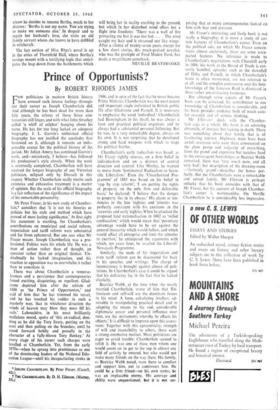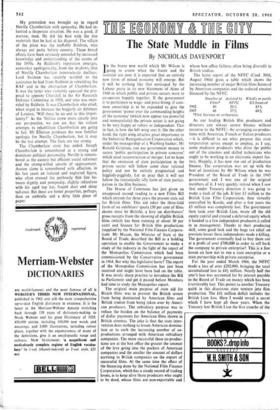Prince of Opportunists?
By ROBERT RHODES JAMES
FEW politicians in modern British history have aroused such intense feelings through-
out their career as Joseph Chamberlain did. And although he has been dead for more than fifty years, the echoes of those fierce con- troversies still linger, and with what John Strachey called 'a whiff of sulphur' hanging about his name. He has for too long lacked an adequate biography. J. L. Garvin's unfinished official biography has not justified the accolades first bestowed on it, although it remains an indis- pensable source for the political history of the period. Mr Julian Amery has continued Garvin's work, and—mistakenly, I believe—has followed his predecessor's style closely. When the work is eventually completed, Chamberlain will have received the longest biography of any Victorian politician, eclipsed only by Disraeli in this respect. Whether Chamberlain really merits such extensive and exhaustive treatment is a matter of opinion. But the scale of his official biography is a fair reflection of the significance of the impact of his remarkable personality.
Mr Peter Fraser, in his new study of Chamber- lain,* considers that 'it is not his theories or policies but his style and method which have proved of most lasting significance.' At first sight this statement is startling, for Chamberlain's contributions on municipal and social reform, imperialism and tariff reform were substantial and far from ephemeral. But one sees what Mr Fraser means. Joseph Chamberlain was a pro- fessional. Politics were his whole life. He was a man of action rather than of thought, an operator rather than an original thinker. Un- doubtedly he lacked imagination, and his reaction to opposition was to overwhelm it rather than to conciliate it.
There was about Chamberlain a remorse- lessness and a persistence that contemporaries found exciting, disquieting, or repellent. Glad- stone depicted him after the schism of 1886 as 'the Prince of Opportunists,' and said of him that 'he has trimmed his vessel, and he has touched his rudder in such a masterly way, that in whichever direction the winds of heaven may blow they must fill his sails.' Labouchere, in his most brilliantly malicious mood, spoke of 'this ex-radical, don- ning as he did the Tory livery, putting on the coat and then puffing on the breeches, until he stood forward boldly and proudly in the character of a fully-blown Tory flunkey.' At every stage of his career such charges were levelled at Chamberlain. Yet, from the early 1870s—when he sprang into prominence as one of the doininating leaders of the National Edu- cation League—until his incapacitating stroke in
* JOSEPH CHAAISMIAHL By Peter Fraser. (Cassell, 42s.)
35st Tye CsameattAms. By D. H. Elletson. (MurraY, .) 1906, and in spite of the fact that he never became Prime Minister, Chamberlain was the most potent and important single individual in British public Iffe after Gladstone and Parnell. It is necessary to emphasise the word 'individual.' Chamberlain had Birmingham in his thrall, he was always a keen and practical political organiser, and he always had a substantial personal following. But he was, to a very remarkable degree, always on his own. It is not surprising that be developed strong and hard weapons with which to wage his political battles.
Chamberlain's early radicalism was based, as Mr Fraser rightly stresses, on a firm belief in individualism and on a distrust of central direction and control. Like Morley, he wanted to move from 'Sentimental Radicalism to Scien- tific Liberalism.' Even the 'Unauthorised Pro- gramme' of 1885 was based on his belief in `step by step reform'; 'I am putting the rights of property on the only firm and defensible basis,' he declared; 'I believe that the danger to property lies in its abuses.' His alarm at ten- dencies in the late 'eighties and 'nineties was perfectly consistent with his exertions in the 'seventies and early 'eighties.When he attacked the proposed land nationalisation in 1882 as 'veiled confiscation,' which would mean that 'pecuniary advantage would have to be set against the general insecurity which would follow, and which would affect all enterprise and limit the stimulus to exertion,' he anticipated the arguments with which, ten years later, he assailed the Liberals' Newcastle Programme.
Similarly, the seeds of his imperialism and even tariff reform can be discovered far back in his speeches and writings. The charge of inconsistency is brought against almost all poli- ticians. In Chamberlain's case it could be argued that his deficiency lay in the fact that he lacked elasticity.
Beatrice Webb, at the time when she nearly married Chamberlain, wrote of him that 'En- thusiasm and self-will are the dominant forces in his mind. A keen, calculating intellect, ad- mirable in manipulating practical detail and in adapting the means to the end, considerable diplomatic power and personal influence over men, are the instruments whereby he effects his objects.' It is difficult to improve upon this assess- ment. Together with this egocentricity, strength of will and insensibility to others, there went a strong combative instinct. Most politicians are eager to avoid trouble; Chamberlain seemed to relish it. He was one of those men whom one would count on to get to the top in almost any field of activity he entered, but who would not make many friends on the way there. His family, as Beatrice Webb noted, were there to comfort and support him, not to controvert him. He could be a firm friend—on his own terms; he was an implacable enemy. His courage and ability were unquestioned; but it is not stir-
prising that so many contemporaries looked on him with fear and aversion.
Mr Fraser's interesting and lively book is not really a biography; it is more a study of cer- tain features of Chamberlain's career. Even on the political side, on which Mr Fraser concen- trates almost exclusively, there are some unex- pected features. No reference is made to Chamberlain's negotiations with Churchill early in 1886; his work at the Board of Trade is cur- sorily handled; episodes such as the downfall of Dilke and Parnell, in which Chamberlain's name is often mentioned, are not referred to at all; and the complex controversy over his fore- knowledge of the Jameson Raid is dismissed in three rather unsatisfactory footnotes.
But although some aspects of Mr Fraser's book can be criticised, his contribution to our knowledge of Chamberlain is considerable, and his book provides evidence both of much care- ful research and of serious thinking.
Mr Elletsont deals with the Chamber- lain saga as a whole. His book is an admiring chronicle, of interest, but lacking in depth. There was something about that family that is of fascinating interest. Highbury must have been a�sful; everyone who went there commented on the glum pomp and vulgarity of everything, from the grand and expensive but tasteless food to the extravagant furnishings; as Beatrice Webb remarked, there was 'very much taste, and all very bad'; her description of the drawing-room —'forlornly grand'--describes the house per- fectly. But the Chamberlains were a remarkable and united family. Mr Elletson is perhaps unlucky that his book coincides with that of Mr Fraser, but his account of Joseph Chamber- lain's career is workmanlike. On Neville Chamberlain he is considerably less impressive. My generation was brought up to regard Neville. Chamberlain with sympathy. He had in- herited a desperate situation. He was a good, if narrow, man. He did his best with the few materials that he had at his disposal. The villain of the piece was the ineffable Baldwin, who always put party before country. These broad effects have been seriously amended by increased knowledge and understanding of the events of the 1930s. As Baldwin's reputation emerges, somewhat apologetically, from the shadows, that of Neville Chamberlain remorselessly declines. Lord Swinton has recently testified to the assistance he had from Baldwin in rebuilding the RAF and to the obstruction of Chamberlain. It was the latter who violently opposed the pro- posal to appoint Churchill to the Air Research Defence Committee in 1935, and who was over- ruled by Baldwin. It was Chamberlain who cried, when urged to increase the beggarly air defences of London, 'Will there be no end to this impor- tunity?' As the 'thirties come more clearly into our perspective, we can see that the valiant attempts to rehabilitate Chamberlain are going to fail. Mr Elletson produces the now familiar apologia for Neville Chamberlain, but it may be the last attempt. The facts are too strong.
The Chamberlain story has ended. Joseph Chamberlain is remembered as a strong and dominant political personality. Neville is remem- bered as the austere but efficient social reformer and the strong-willed apostle of appeasement. Austen alone is remembered with affection, in his last years an isolated and neglected figure, who often crossed the perilously thin line be- tween dignity and pomposity, slightly ridiculous with his aged top hat, frayed shirt and shiny tail-coat. But these are better properties, perhaps, than an umbrella and a dirty little piece of paper.







































 Previous page
Previous page